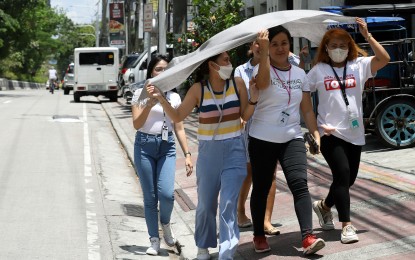
SHELTER FROM THE HEAT. A group of women use a cloth to shelter themselves from the scorching sun as they walk along Don Alejandro Roces Avenue in Quezon City on April 19, 2023. With the strong and mature El Niño expected to persist from February until May 2024. the Department of Health has issued a public health advisory to help people avoid diseases that may be caused by extreme weather conditions. (PNA photo by Robert Oswald P. Alfiler)
LEGAZPI CITY – The Department of Health-Center for Health Development (DOH-CHD) in Bicol on Thursday urged the public to follow measures to prevent El Niño-related health issues.
In an advisory, DOH-Bicol warned that besides heat-related issues, prolonged drought can lead to an increased risk of vector-borne diseases like dengue, chikungunya, cholera, and typhoid fever.
"Drink at least eight glasses of water daily, seek out cool or air-conditioned places to cool off, avoid leaving children or pets in closed parked vehicles, wear comfortable cotton clothing, apply sunscreen with a sun protection factor (SPF) of 50, wear sunglasses for eye protection, avoid salty and oily foods, and opt for fruits and vegetables as part of your diet," the DOH-Bicol said.
To prevent dengue and chikungunya, the DOH encouraged the practice of the “5S strategy” to help contain mosquito-borne diseases -- searching and destroying mosquito-breeding sites; observing self-protection measures such as wearing long sleeves and socks; seeking early consultation in different rural health centers; support fogging only in outbreaks; and sustain hydration.
"Immediately consult with your primary health care provider for advice and management of health concerns due to El Niño," it added.
To avoid cholera and typhoid fever (food and waterborne diseases), DOH-Bicol said it is important to wash hands before and after cooking and eating, and after using the toilet.
The DOH added that the public must also ensure the safe and clean preparation of food and water; store water in a tightly sealed container; make sure to clean raw and fresh food thoroughly; and maintain proper hygiene and cleanliness of the surroundings.
The Philippine Atmospheric, Geophysical, and Astronomical Services Administration reported that strong and mature El Niño is expected to continue this month and will likely persist until May 2024. (PNA)
